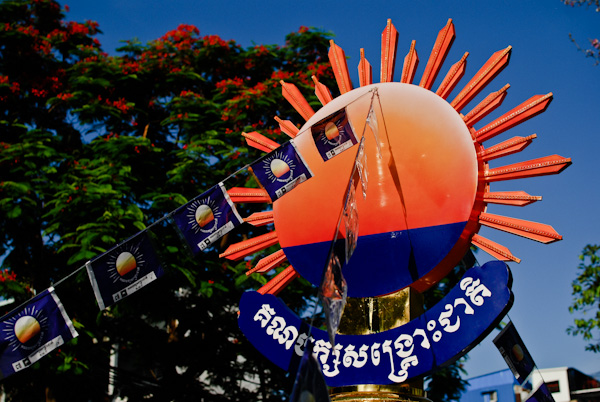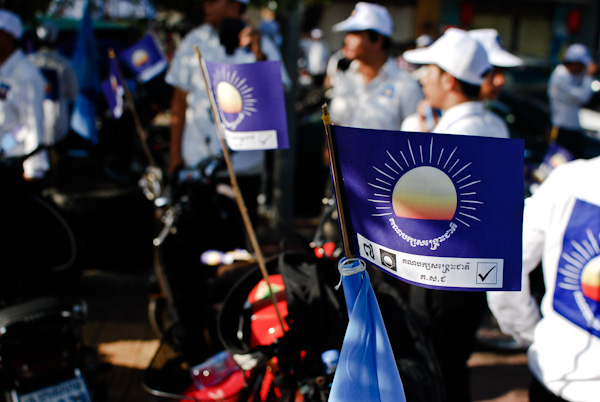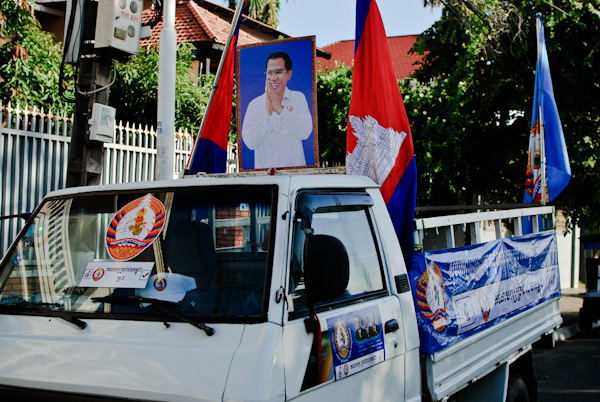PHNOM PENH – After nearly four years on the political margins, Cambodian opposition leader Sam Rainsy will again take center stage when he returns to his homeland on Friday in advance of national elections on July 28.
The president of the Cambodia National Rescue Party (CNRP) has been living in France to avoid an 11-year jail term for defamation and other charges handed down in connection with a stunt in which he uprooted demarcation posts along the Vietnamese border in late 2009. Following a royal pardon last Friday, the 64-year-old can now return without fear of arrest and will immediately throw himself into campaigning against the country’s long-serving prime minister Hun Sen.
For Rainsy, the pardon, engineered by Hun Sen and rubber-stamped by King Norodom Sihamoni, is the culmination of four years of lobbying in Western capitals, where he has struggled-often in vain-to keep Cambodia on the international agenda. As the election has drawn near, his efforts have started to pay off.
In the past few months, the US State Department has rebuked Cambodia for glaring problems in its electoral process, including Rainsy’s absence from the country and the ruling party’s expulsion of 28 opposition lawmakers from the National Assembly last month. It also slammed a government ban-since reversed-on the airing of foreign radio broadcasts during the month-long campaign period. (A separate ban on foreign election-related broadcasts in the five days prior to polling day remains in place).
The US Congress has also upped the pressure. In a June 7 resolution, US Senators Lindsey Graham and Marco Rubio called for a freeze on US aid to Cambodia if the coming election is “not credible and competitive”. A similar resolution is also set to be introduced in the US House of Representatives, where Congressman Dana Rohrabacher, a long-time Rainsy ally, denounced Hun Sen as “a corrupt, vicious human being, who has held that country in his grip for decades”. The US politician added: “It’s time for Hun Sen to go.”
The 61-year-old strongman, Asia’s longest serving prime minister, clearly has different plans. Hun Sen has been in power since 1985 and his Cambodian People’s Party (CPP) enjoys all the advantages of decades-long incumbency: a pliant court system and government administration, a near-monopoly on media coverage, the support of the army and police, and the financial backing of a clique of friendly crony-tycoons.
The CPP has increased its share of National Assembly seats at every national poll since the United Nations-backed 1993 election-in 2008, it won 90 out of 123 seats-and controls appointments to the country’s National Election Committee (NEC). Despite his rival’s return, Hun Sen will almost certainly win again by a big margin.
For a large percentage of Cambodians, politics generally remains a case, to paraphrase German playwright Bertolt Brecht, of “first rice, then democracy”.
Even so, the CPP has spared no expense in its election campaign, monopolizing public space with the party’s blue campaign posters and sending paid party activists through the streets of the capital to wave flags and blare pro-government techno music. Earlier this month, the CPP released a slickly-produced campaign video featuring karaoke star Nop Panharith, which mixed homilies to Hun Sen’s “iron-fisted” leadership with footage of Angkor Wat and sweeping helicopter shots of party youth activists forming a large number 4-the CPP’s ballot number-on the roof of Phnom Penh’s Canadia Bank building.
For all its newfound multimedia-savvy the CPP has kept its message simple, emphasizing the party’s role in deposing the Khmer Rouge in 1979, forging peace, and fostering a period of impressive economic growth. For the three-quarters of the Cambodian population who still live in poor rural areas, it remains a convincing pitch, made all the more so by memories of past horrors and conjured-up fears that the country might somehow slide back into chaos.
In a poll conducted in Cambodia earlier this year, the US-funded International Republican Institute found that 79% of respondents thought the country was heading “in the right direction”, while 74% hailed the ruling party’s road-building as a key achievement. For a large percentage of Cambodians, politics generally remains a case, to paraphrase German playwright Bertolt Brecht, of “first rice, then democracy”.
But Cambodia’s political landscape is slowly changing. In the upcoming election around 3.5 million of the country’s 9.5 million registered voters will be between the ages of 18 and 30, according to the NEC, of which 1.5 million, or 15% of the electorate, will be voting for the first time. What this means is that as much as half the Cambodian population now has no memory of the horrors of the Khmer Rouge, who ruled the country from 1975-79.
As a result, the opposition CNRP-formed last year from a merger of Rainsy’s eponymous party and the Human Rights Party founded in 2007 by Kem Sokha (now the CNRP’s deputy president) hope they will be more open to a campaign focused on corruption and job creation. “[Young people] feel that it’s their future which is being challenged now,” said Long Botta, a former education minister who is running as a CNRP candidate in western Battambang province. “Things have changed for most of them. They’re in a bubble of excitement.”
Change or no change?
Lacking the CPP’s financial resources, the CNRP has built its campaign around a Barack Obama-esque mantra “change or no change?”, which has been taken up enthusiastically by young supporters at party rallies. The party also hopes to capitalize on simmering discontent related to state-backed land-grabbing, which by one count has affected 300,000 people across the country since 2003 and has escalated considerably since the last national election in 2008.
There are signs that the CPP is growing worried about its hold on power. Despite a convincing victory in commune elections in June 2012, the party took some unexpected hits in its rural heartland. To mollify land concerns, Hun Sen formed a troupe of paid “volunteer” students who fanned out across the country handing out new title deeds to affected villagers. In the first half of 2013, he also presided over the inauguration of 22 Buddhist pagodas, many located in key “swing communes”.
Addressing audiences of rice farmers, he openly warned that the benefits of CPP rule-particularly its infrastructure projects and patronage of Buddhism-will come to an end if he loses power. “If people don’t vote for [the CPP], we will be disheartened and will stop giving,” he said during the inauguration of a national road in March. “All projects will be eliminated. … Even a project like pumping water to dry farms.” The next month he even warned of “internal war” if the opposition came to power.
In the context of a close-fought poll, Rainsy’s return to Cambodia presents both pitfalls and opportunities for the opposition. Some observers think that by energizing the CNRP campaign, it will help the opposition build on the 29 out of 123 seats it currently holds in the National Assembly. “It will give the party a big boost,” said Lao Mong Hay, an independent political analyst. “This party has generated what might be called a mass movement for change across the country, and it has been gaining momentum during the absence of its leader.”
But Rainsy’s return could also benefit the wily Hun Sen, who as always has his eye on the long game. Elections are always a magnet for international attention, and with the spotlight glaring some kind of political arrangement to secure Rainsy’s return was always likely for the sake of appearances. But will the attention be sustained after the polls?
In February 2006, a year after Rainsy was hounded out of Cambodia by defamation lawsuits brought by Hun Sen and his then-coalition partner Prince Norodom Ranariddh, he received a royal pardon and returned hailing a “new chapter in Cambodian history”. A few years later, after the CPP secured a landslide electoral victory in 2008, the government tightened the screws again by dragging journalists and opposition figures through the courts. Following his border post stunt in October 2009, Rainsy himself was forced back into exile.
In 20 years, Hun Sen has lowered democratic expectations to such a degree that the mere presence of an opposition leader on Cambodian soil may now be enough get it over the line.
Optimistic observers hold out hope that this time things will be different. “The pressure has been mounting over time,” said Lao Mong Hay. “It seems America means business.” But history suggests otherwise. As Hun Sen has consolidated his control over the past 20 years, he has repeatedly used “royal” pardons as a means of resetting the status quo by defusing pressure from abroad and extracting political concessions from his rivals. In 2006, Rainsy offered a public apology to Hun Sen and Ranariddh in return for his pardon. The currency on offer this time is legitimacy: Rainsy’s presence is set to boost the credibility of what will remain a seriously flawed election.
Rainsy himself has warned that “the mere fact of my return does not create a free and fair election for Cambodia”. But Hun Sen knows that the main question for foreign governments is not whether the election will be “fair” in absolute terms – no election since 1993 really has been – but rather whether the poll is fair enough.
Ou Virak, president of the Cambodian Centre of Human Rights, said prior to Rainsy’s pardon that based on past practice foreign governments – having long learned to live with Hun Sen – will admit “irregularities” in the vote but probably accept the result. “My view is that the donors … will see the injustice, will complain about it, but will never ever take a stand,” he said.
In 20 years, Hun Sen has lowered democratic expectations to such a degree that the mere presence of an opposition leader on Cambodian soil may now be enough get it over the line. Foreign Minister Hor Namhong has already claimed that Rainsy’s presence is in itself a guarantee of a “free and fair” poll.
With or without Rainsy, the real long-term danger for the CPP will be maintaining the political momentum generated by its own propaganda. Hun Sen is characterized in increasingly superhuman terms-as a military genius, a political mastermind, and man of overweening merit who rains blessings on the people.
It is a myth that can only really be perpetuated by ever-greater margins of electoral victory. If Rainsy and his reinvigorated party are able to eat into the CPP’s rural vote-bank, it is possible that Hun Sen’s carefully cultivated aura of invincibility might slowly, if imperceptibly, begin to fade. If that were the case, the gamble of Rainsy’s return might just be worth it.
Published by Asia Times Online, July 15, 2013






